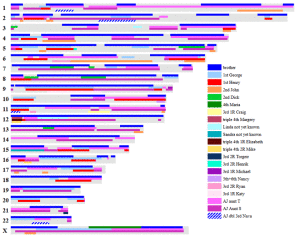I can only imagine the pain of not knowing your family’s medical history or origins or why your mother gave you up for adoption.
DNA testing has reunited many adoptees with their birth families. Some get lucky and find their biological parents within days of their test results. Others work on it for years before succeeding. There are some wonderful reunion stories at DNAadoption.com – Trish’s story moved me to tears, as did many of the others. That web site has a tried and true methodology and classes for using DNA in these searches.
Richard Hill, an adoptee who found his biological roots, has just published an excellent two page summary of how to use DNA testing for adoptees. A great starting point, it is available at http://www.dna-testing-adviser.com/support-files/seven-guidelines-for-adoptees.pdf
Also if you have not read his autobiographical story of his search, I highly recommend it; click on image at the left to get that book from Amazon. It reads like a good mystery novel.
Times have changed now and for many it is no longer an embarrassment to have a child out of wedlock. These days an adoption can be open, which solves the medical and ancestry issues for the adoptee (see http://www.adoptionhelp.org/qa/what-open-adoption ). But back in the 1950s and 1960s, being unmarried and pregnant was a huge social stigma, so many of those women still want to hide that fact today.
How would you feel to discover an unknown half sibling? Most stories that I have heard have the family welcoming the adoptee even if the mother pretends it never happened, but there are plenty of folk who cannot imagine their mother having done this.
 My own DNA testing has turned up several adoptees who are listed as 2nd-4th cousins. In one case I think I may have found the biological father, a 3rd cousin once removed of mine that I have never met or been in touch with. I will not be sure until more DNA tests come in. I have not contacted the suspected father since he was married at the time to his current wife and she was expecting their first child. The adoptee was not interested in finding his biological family, he was content to know his ethnic mix and medical risks (he did 23andme before the FDA crack down).
My own DNA testing has turned up several adoptees who are listed as 2nd-4th cousins. In one case I think I may have found the biological father, a 3rd cousin once removed of mine that I have never met or been in touch with. I will not be sure until more DNA tests come in. I have not contacted the suspected father since he was married at the time to his current wife and she was expecting their first child. The adoptee was not interested in finding his biological family, he was content to know his ethnic mix and medical risks (he did 23andme before the FDA crack down).
Although I am more than happy to help my adoptee DNA cousins, it is really up to them how far they want to take it and how much work they are willing to put in. Sometimes it is hard to restrain my helpful nature and remember that it is their quest, not mine.
About a year ago, I donated a program called Kworks to the DNAgedcom.com site. It sorts and matrixes your DNA segment data online from an uploaded CSV. I promise to blog about it soon, just as soon as I fix the blank names bug!

Feeling someone else’s situation is one thing that makes humans different from animals. And yet many people are not good at doing just that. Finding out about our ancestors tends to exercise this mental muscle and I find experienced family historians are often more tolerant of human frailties. Adoption is a sensitive area and your question “How would you feel…?” is a good reminder to show empathy.
Kitty, I just noticed this article on your blog about my article and book on DNA testing for adoptees. My mission is to educate all the adult adoptees in America about genetic genealogy and what it can do for them. To test or not is up to each person. But I want them to know about the possibilities and to use the right tests for their situation. I also want genealogists to be aware of adoptee searches and be willing to help when needed. It’s our data that often holds the key to identifying an adoptee’s first family. Your blog post helps further that cause. Thanks! Richard Hill
Richard I applaud your work and I loved your book. Happy to help out!
Most adoption stories center on 20th century adoptions. However, in my case, I have a great-grandmother who was adopted in the 1880’s. Even though I have her adoption record, it was a very rural area and many family stories about the adoption never made sense to me. Unfortunately, I was unable to get my grandfather (her son) tested before his death. But, by using my mother’s DNA, I have been able to put a strong hypothesis together- one that I had been betting on for a few years. It may never be clear because all the people with 1st hand knowledge are long gone, but I’m hopeful that as more people become interested and get tested a more conclusive case can be proved.